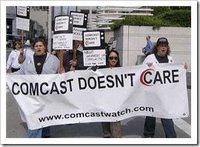 The Federal Communications Commission last Friday formally ruled that Comcast's traffic throttling practices were illegal, setting a precedent for US Internet providers. The decision acts on a recent report of the FCC's plans and requires that the the cable company stop the filtering it has used so far, which uses a Sandvine program that automatically breaks the connection between Comcast users and others running BitTorrent clients and certain peer-to-peer software. The ruling also requires that Comcast disclose how it performs any future throttling, which the provider already plans to do but in a more general form.
The Federal Communications Commission last Friday formally ruled that Comcast's traffic throttling practices were illegal, setting a precedent for US Internet providers. The decision acts on a recent report of the FCC's plans and requires that the the cable company stop the filtering it has used so far, which uses a Sandvine program that automatically breaks the connection between Comcast users and others running BitTorrent clients and certain peer-to-peer software. The ruling also requires that Comcast disclose how it performs any future throttling, which the provider already plans to do but in a more general form.
The FCC bases its decision largely on a non-binding 2005 statement that high-speed Internet access should be open and widely available, a framework that both the FCC and advocates have said establishes a basis for net neutrality that gives all content the same level of access. By punishing certain forms of file sharing traffic simply through their format, Comcast is violating the principle of that statement, critics charge.
Voting for the ruling resulted in a narrow 3-2 decision that saw significant opposition from FCC chairman Kevin Martin's fellow Republicans in the Commission as well as repeated opposition from Comcast itself. The telecoms firm first denied its throttling practice but has since been forced to acknowledge its existence, now claiming it to be a "reasonable" measure to prevent heavy downloaders from bogging down the rest of the network.
A statement issued by Comcast in the wake of the ruling tries to minimize the perceived impact of throttling, saying that it engages only in "very limited" management of peer-to-peer uploads and says that the "overwhelming majority" of traffic is unaffected. The firm also points to its partnerships with BitTorrent and other companies, though these were formed primarily after Comcast's secret throttling methods were exposed.
Martin has added that Comcast's clear attempt to hide and deny its behavior made the offense especially serious.
While the FCC's move has been criticized for the absence of a financial penalty, it nonetheless sets a precedent that may see similar penalties launched against other American providers that either slow down certain types of traffic or else favor traffic to others, such as a company's own websites. Cox and other providers are suspected as following in Comcast's footsteps.
FCC rules Comcast throttling illegal
